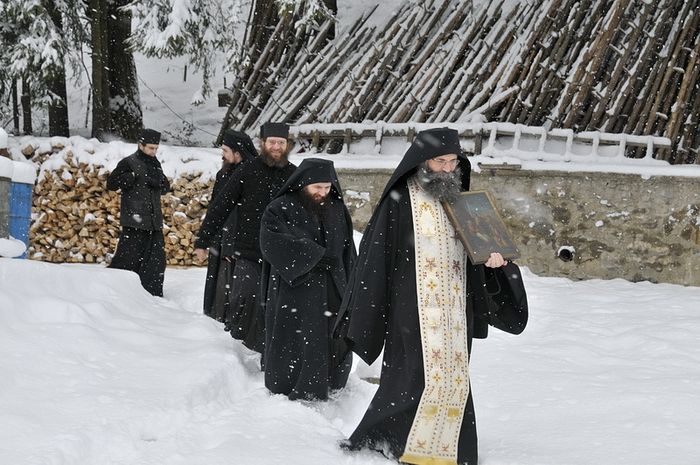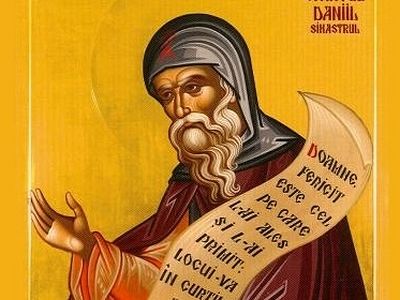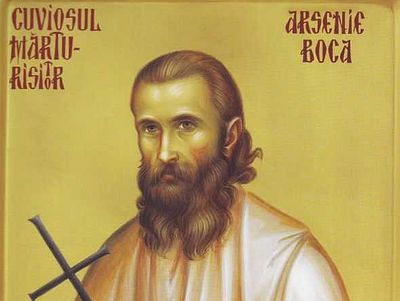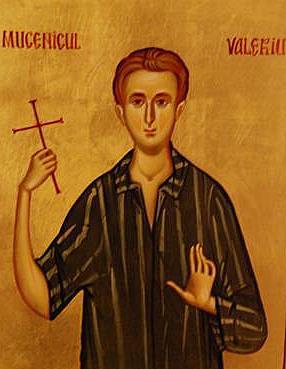
The Romanian people—situated, according to historical chronicles, “in the path of all evils”—were destined to pass through many trials. The latest was the worst: the Communist steamroller. This demonic ideology, nothing other than the religion of Satan on earth, as someone who passed through Communist prisons called it, claimed hundreds of thousands of victims among us. It did not succeed, however, in breaking those who, not wanting to lose their souls held steadfast with all their being to Christ. Enduring horrible suffering and finally dying at the hands of Communists, they acquired the crown of sainthood.
“Communism filled heaven with saints,” said Father Arsenie Papacioc. If one could somehow come to know all those of our people who passed the threshold of sainthood during the Communist persecution, he would also understand the words spoken in the seventeenth century by the holy Metropolitan Dosoftei of Moldavia: “Therefore also among the Romanians are many saints ... but no one has sought them out.”
Nevertheless, it would be of no small benefit to anyone to devote oneself to reading testimonies of those who passed through these prisons. In them, one would find such valuables which can rightly be compared to those found in a paterikon or in the lives of the saints.
Among the many portraits of the confessors, one will be found in particular that is recalled with reverence by all and is considered a saint: Valeriu Gafencu. Nicknamed “the saint of the prisons” by Father Nicolae Steinhardt in a truly inspired moment, Valeriu Gafencu was one of the more impressive figures who lived an admirable spiritual life amidst prison conditions.
Through his sacrificial love springing from a perfect dedication of his life to Christ, he remains painted in the most luminous of colors in the hearts of those who knew him. Father Gheorghe Calciu wrote, “I have no doubt that he is a saint. He lived the word of God to such a level that it was incomprehensible for us.”
Devoting themselves to the prayer of Jesus, studying and learning texts from the Holy Scripture, the Philokalia, and other patristic writings, these prisoners were to form, in the Communist prisons, a philocalic way of life. United in their desire to sacrifice themselves for Christ, these monks in spirit—for as we shall see, they lived a high level of asceticism at Aiud—supported each other, preparing themselves for the difficult trials which were yet to come.
Looking back on these long and hard years of imprisonment, Elder Arsenie Papcioc sees them as a blessed opportunity for strengthening his faith:
There were no other means of preparation that could offer such possibilities for growing in one’s faith, for a spiritual deepening, for a living relationship with God as were offered by the tribulations of imprisonment. I bless that period of time. I spent years in the wilderness without coming upon the possibility to deepen my thoughts of eternity, of the divine nature; this possibility was accorded me by way of the torturous dailiness [of life in a Communist prison]. Suffering also united us. Those of us who succeeded in knowing each other on the cross, so to speak, remained united.
These prisoners who were monks at heart, clothed the conditions of prison life in monastic garb.
“Prison created special conditions for you,” says Virgil Maxim:
Your cell became a sanctuary of prayer, of nourishment, an opportunity for ascesis, solitude, renunciation of the material goods and joys of life, an opportunity to live as paupers, in purity and chastity. The chronic uncertainty of our situation enabled us to put our trust in the will and providence of God. Obedience requires a superior—a father confessor—to whom one submits, and God also offered us this gift through the presence of our priests. We were also obedient to the program imposed by worldly authority, as an act of divine pedagogy, in which your will enters consciously in submission to the divine will.
From the book The Saint of the Prisons—Notes on the Life of Valeriu Gafencu
The Way of Blessedness
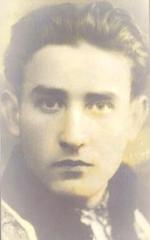
Weak in faith and spiritually impoverished by a lifestyle full of comforts, modern man understands only partially and not without difficulty the sufferings of those who endured life in prison. Many testimonies seem unbelievable to those of us who, as one poet has said, were not with them in the prison cell and do not know the life of darkness. We cannot imagine how they endured so much suffering. But what is even more difficult for us to understand, if not beyond our comprehension, is the nostalgia felt by prisoners when they look back at the time spent in prison.
“It is impossible for someone [free], outside of prison, to understand," Father Gheorghe Calciu tells us.
“We [who were in prison] are [now] free and we are very happy that we are free, but we have a kind of nostalgia for prison. And we can’t explain it to anyone else. They say we’re crazy. How can you miss prison?
Because in prison I lived the most spiritual life. I attained to spiritual heights that I am not capable of reaching in freedom. Isolated, anchored in Jesus Christ, I had a joy and an enlightenment that the world cannot offer. I can’t find the words to express with precision the feeling that I had there. Those that did not live this experience cannot understand how we could be happy in prison.”
Valeriu Gafencu lived such happiness—beyond our understanding—in spite of suffering. Virgil Ioanid remembers how, on the road between two prisons, in a police van, laid low by tuberculosis, his cheeks bright red with fever, Valeriu spoke of “the happiness of suffering for Christ and of enduring, like the first martyrs, the persecution unleashed by the enemies of the faith.” Likewise, in a letter sent to his family, he confessed, “Today I am happy. Through Christ I love everyone.”
After arriving at Aiud, Valeriu lived under a harsh regime. For a long time, as he later confessed, he spent much time in isolation, being taken out for a walk only an hour and a half per day. The beginning was not at all easy. “And, dear Mama,” he said in a letter, “I’d like you to know that I suffered very much. During the first winter I would wake up at night and in the solitude of my cell, in cold and in hunger, I looked into the darkness and whispered quietly, so that only I would hear, but loud enough for God to hear, ‘Mama, I’m cold and I’m hungry.’ At the beginning it was very hard.”
The suffering was all the more oppressive because believing in his innocence, he didn’t understand his imprisonment. “From the very beginning, I wondered why I was locked up. In my former social life, in my relationships with people, I was considered a very good person, an example of moral conduct. If I entered into conflict with anybody, it was for the sake of Truth.”
In the midst of this spiritual grinding, he sought an answer in the books that were circulating in prison.
At the beginning, he studied and read very much, but soon his attention was drawn to Christianity, which appeared to him in its true light, in its spiritual intent. Valeriu dedicated himself to intense theological study, undertaking a careful examination of Orthodox spirituality. Among the books he read were the Paterikon, The Salvation of Sinners, The Lives of the Saints, Imitation of Christ. He read St. John Chrysostom, St. Basil the Great, St. Gregory Palamas, St. Gregory Nazianzen, St. Ephrem the Syrian, St. John Damascene. He also studied Pascal, Bulgakov, Berdyaev, Papini, as well as all the courses offered at the School of Theology. His reading concentrated especially on Holy Scripture.
Spiritual books helped him see things more deeply and turn more toward his inner self. In the solitude of his cell he prayed very much, seeking to understand the meaning of suffering. After a time of tormenting unrest and struggle, he experienced through the grace of God a state of enlightenment in which he saw his soul full of sins.
“After a time of much uneasiness, after experiencing a great deal of pain, when the cup of suffering had filled up, there came a holy day, in June 1943, when I fell to the ground, on my knees, my head bent, my heart shattered, in a burst of tears. I prayed to God that He grant me light. At that point I had lost all faith in people. I realized perfectly well that I was in truth, but then why was I suffering? Within my zealous soul only love had remained. No one understood me.
“During this long period of weeping I began to do prostrations. And suddenly—O Lord! How great art thou, Lord!—I saw my soul full of sins, I found within myself the root of all the sins of mankind. Alas, so many sins, and the eyes of my soul, hardened by pride, had not seen them. How great is God!
“Seeing all my sins, I felt the need to shout them forth and cast them away from me. And a deep peace, a deep wave of light and love poured into my heart. As soon as the door opened, I left my cell and went to those whom I knew to love me and to those who hated me and to those who had most wronged me and I confessed to them openly, ‘I am the most sinful man. I do not deserve the trust of even the last among men. I am blessed!’
“Everyone was astounded. Some looked at me with disdain, others with indifference. Some looked at me with a love that they themselves could not have explained. A single person said to me, ‘You deserve to be kissed.’ But I fled quickly back to my cell, threw my head into my pillow and continued my weeping, thanking and glorifying God.”
This moment of enlightenment was a true rebirth for Valeriu. The most immediate benefit of the awareness of sins is the understanding of the meaning of suffering.
“Suffering, no matter how difficult it may be, has no other meaning than the cleansing of souls thirsting for salvation.”
From day to day he created order in his soul, he became a new person, he accustomed himself to life in the Spirit in accordance with Christian teaching. His progress was harmonious, seeking to realize the new man. Through the grace of God, he went down the path of the most authentic Orthodox spirituality.
“When he was feeling better,” continues Ianolide, “Valeriu spoke beautifully and with fervor, focusing mainly on his favorite subject: interior purification and union with Christ.
“Through baptism, we received purifying grace, while being anointed with Holy Chrism, we have been adorned with all the gifts of the Holy Spirit. But this blessed internal state is ineffective within us, we are Christians in name only. We live in a world of confusion, of loose morals, of sin. It’s considered shameful to be a believer, and old-fashioned to be moral. The baptized man, in order to be saved, has to live all his life in the Holy Spirit, but we haven’t succeeded in doing this. We have believed, we have prayed, we have kept the faith, we have suffered, but in order to be united with Christ, one must purify oneself inwardly through confession and renew oneself through Holy Communion. Therefore unite yourself to Christ conscientiously and with great steadfastness, making yourself a bearer of His holiness, His power, His love, His light, His immortality. You must oppose sin mercilessly. Then you will be born anew. There is no path of compromise."
Another time he said to us, “The teaching of Christ is so wonderful, so consummate, that if we understand it, we have the most powerful argument possible for the existence of God. When I had this revelation, I wept from pain and from happiness! Those who believe in Him must bear witness to this truth even if it means being martyred. Wasn’t the Son of God killed as an enemy of His people?"
One day Valeriu was feeling so bad that we thought he was going to die. In addition to all the other illnesses he suffered from, he also developed acute appendicitis. He could have been left to die, but that would not have been "humanitarian." Humanitarianism is the hypocrisy of cruelty, it brings to light the poisonous and lamentable domain of the Communist revolution, with its slogans and beautiful vestments. So the doctor sent a report to prison administration so that he could be transported to the hospital in town for an operation.
The penitentiary agent came to him and said: "Your life is in my hands. If you don’t have this operation, you will die."
Valeriu smiled indulgently and answered: "If one man’s life depends on another, then this man indeed has great responsibility! But if everyone would realize that their lives depend on God, then everyone would value the life of his neighbor!"
"You’re crazy," the agent said to him, and sent him to the operating room under strict guard.
When he came back to the sanatorium, the agent said to him: "Look, you were face to face with death! You see, we wanted to show you that your life is in our hands. Maybe now you’ve changed your mind and you’ll cooperate with us. We’ll give you streptomycin141! You’ll also get packages from your family. And you know what might happen later? … You’re an intelligent man and you could be useful to us. We know that you’re not interested in politics, but in religion, but isn’t the patriarch and all of his priests on our side now? Why don’t you join our side too? You have a lot to gain!"
"I thank you for allowing me to have an operation. From now on, my torments will go on even longer ... As for the rest, between you and me, there is a matter of conscience. For the sake of my spiritual freedom I have decided to die. It is good that the truth be told plainly, and I serve the truth. I am not the judge of others, but a confessor of God. There is nothing under the sun that can survive without God. You cannot accept Christ. I cannot accept spiritual death."
"I told you already that you are crazy!" shouted the agent. "I’m going to file a report. You are a reactionary, a fascist, an enemy of the people, in the service of American bandits! We know how to deal with people like you! You’re only fit to die! Go and die with your Christ! I won’t try to stop either Him or somebody like you!"
"You can kill me now, but no one can kill Him any longer. He is a stumbling block for all kinds of pride. Understand well that Christ is the only power that can deliver mankind from suffering and sin."
"Give up all this nonsense. The truth is on our side!"
"The truth is love that sacrifices itself for the poor and the persecuted!"
"Look here, you’re staring death straight in the face and you’re giving me mystical sermons?! You want to convince me too? See, now you’ve gone too far! You’ve spread yourself too thin."
Valeriu struggled to keep looking at him, because his eyelids had grown heavy. He felt worn out physically, but an internal joy compelled him to speak about faith in order to leave an eternal testimony. The smile of his measureless love blossomed on his cheeks. He prayed in secret for this unhappy man and for God to deliver the world from leaders like him.
The agent was confused, muddled. He swore a blue streak and then ordered that Valeriu be taken back to his room.
I Saw the Mother of God
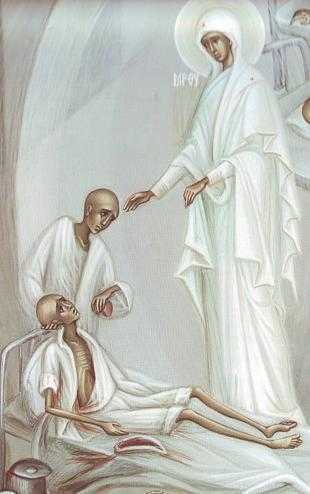
During the night of his last Christmas, toward dawn, Valeriu testified to his friend Ioan Ianolide:
“This night, I kept vigil. I was waiting for my carol to come. I wanted it to be very beautiful. I sang it in my head. I heard it in the high heavens, from where it descended. Rather difficult for me, since I don’t know musical notes and I have to sing by ear. So I was awake, lucid and serene, when, all of a sudden, I noticed a photograph of Seta [the girl he had loved] in my hand. Amazed by this, I lifted my gaze and at the head of my bed I saw the Mother of God, clothed in white, vivid, real. She was without her Child. Her presence seemed material to me. The Mother of God was actually beside me. I was happy. I forgot everything. Time seemed endless. Then she said to me:
I am your love! Don’t be afraid. Don’t doubt. My Son will be victorious. He has sanctified this place now for future life. The powers of darkness are growing and will frighten the world still more, but they will be scattered. My Son is waiting for people to return to the faith. Today, the sons of darkness are bolder than the sons of light. Even though it may seem to you that there is no more faith left on earth, nevertheless, know that deliverance will come, albeit through fire and devastation. The world still has to suffer. Here, however, there is still much faith and I have come to encourage you. Be bold, the world belongs to Christ!
“Then the Mother of God disappeared and I remained overwhelmed with happiness. I looked at my hand, but the photograph was no longer there.”
Not long afterward, he related to Ianolide:
"Late last night I was praying. I felt comforted by the grace of God and I secretly rejoiced in the gift that I had been given. I was awake, conscious, and happy. Suddenly I felt that something odd was happening to me, something apart from my own will. Beginning with the extremities of my body, my soul began to desert me. Not only was I not afraid, but I knew that I was not dying, and the more my soul left my body, the more my interior life grew. My soul ascended easily toward my chest, toward my neck, toward my head. I felt happy, pure, illuminated by a holy light. My mind has never been as lucid as it was then. I knew that the Lord was with me. I was happy to be in His power. Time seemed to expand. I no longer felt pain in my body. I looked at my body without wanting it or rejecting it. Life and matter seemed to me to be miracles. My soul quickly drew up to my mouth and left my body. I realized then that I could go anywhere I wanted without being obstructed by matter. It was wonderful! An unspeakable joy overwhelmed me. My first thought was to go see my family, but I remembered the Fathers in the Paterikon that counsel you not to entrust yourself to the workings of spirits unless you are under obedience, lest the devil deceive you and you be lost. The thought appeared in my mind of the old hermit to whom the devil appeared as an angel of light. The old man had departed from his obedience to the abbot and the monastery and he considered himself guided by God Himself and thought that the others were jealous of him. Then the ‘angel’ came to him and told him to call all the brothers to the well in the courtyard of the monastery in order that the power of God be shown to them. They went to the well in the middle of the night. The bright angel appeared and, entering the well, said to the hermit, ‘Throw yourself into the well and I will pull you out unhurt in front of everyone so that they may see that you are a saint.’ The old man threw himself in and died like a wretch. Reminding myself of this, I was careful not to fall into temptation and I decided to return to my body. Now, you see, I submit to obedience. Tell me what to do and I will do it!"
A letter from Aiud (29 January 1946), Valeriu sent to his family
Life is something other than what people imagine. Man himself is something other than what he imagines himself to be. The Truth is something other than what the human mind imagines. I want to be sincere and open, down to the deepest fibers of my soul. From the very moment in which I first set foot in prison, I wondered why I was locked up. In the realm of social life, regarding my relations with the world in which I lived, I was always considered to be someone very good, an example of moral conduct. If I entered into conflict with anyone, it was only for the sake of Truth. After much struggle and unrest, after much pain, when the cup of suffering had filled up, there came a holy day, in June 1943, when I fell to the ground, on my knees, my forehead to the floor, my heart crushed, in an outburst of tears. I asked God to grant me light. On that day, I had lost all confidence in Man. I realized perfectly well that I was in truth, so why then was I suffering? In all my soul full of spirited self-assurance there had remained only love. No one understood me.
In my prolonged weeping I started to do prostrations. And suddenly—O, Lord! How great art Thou, O Lord!—I saw my entire soul filled with sins. I found within myself the root of all human sins. Oh, so many sins, and the eyes of my soul hardened by pride had not seen them! How great is God! Seeing all my sins, I felt the need to shout them out loud, to cast them away from me. And a deep peace, a deep wave of light and love poured into my heart. As soon as the door opened, I left my cell and I went to those whom I knew loved me the most and to those who hated me and had sinned the most against me and I confessed to them openly and plainly, “I am the most sinful man. I don’t deserve the trust of even the lowliest of men. I am blessed!” Everyone was dumbfounded. Some of them looked at me with contempt, others with indifference, and some looked at me with a love that they themselves would not have been able to explain. Only one single person said to me, “You deserve to be kissed!” But I fled back quickly to my cell, buried my head in my pillow and continued weeping while thanking and glorifying God.
On that day, I began a conscientious struggle with sin. If you could only know how difficult the war with sin is! I want you to know that I struggled very much with sin not only here, but also when I was free. [Here he testifies that, although he was tempted physically, he did not fall, but remained pure.] In prison, I examined my soul and I realized that, even though I had not sinned in deed, I had sinned in word and especially in thought. After a deep examination of conscience, I went to a priest and confessed. My confession unburdened me. And I carry on a continuous struggle. The struggle does not cease with death. Without repentance no one can take even one step forward.Anyone who flees from the reality of his own soul is a liar. What is life? It is a gift from God that is given to us in order to purify our souls from sin and to prepare ourselves, through Christ, to receive eternal life. What is Man? A being created through the limitless love of God and to whom God gave the choice between holiness and death. Be very careful! In social life, people regard each other and judge each other not according to what they are in essence, but according to what they seem to be in form. Have no illusions about Man – anyone who does will suffer bitterly—but love Him. Only one is perfect, only one is good, only one is pure: Christ-God! And now: What is the Truth? The Truth is Christ, the Word of God. Seek to draw near to Christ sincerely and leave the world and its sins in peace!
